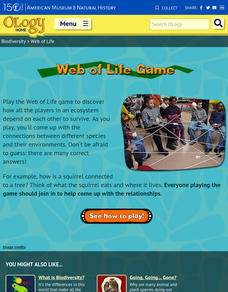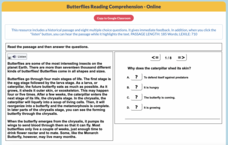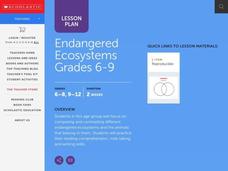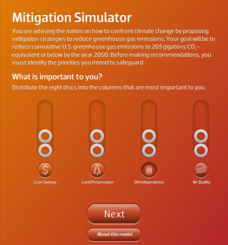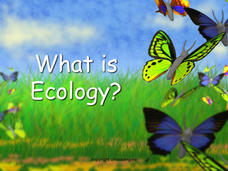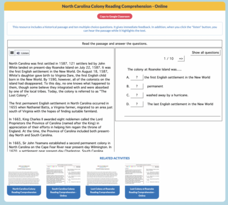Curated OER
World War II - War Comes to Hawaii
Ninth graders use geographic representations to organize, analyze, and present information on people, places, and environments. They use tools and methods of geographers to construct, interpret, and evaluate qualitative and quantitative...
Curated OER
Species and Specimens: Exploring Local Biodiversity
Students practice skills essential to all scientific investigation: carefully observing and collecting data. They become field biologists in a series of hands-on activities to collect and identify specimens, and survey and calculate the...
Teach Engineering
Food Chains and Food Webs - Balance within Natural Systems
Feast on an informative resource. Scholars learn about food chains and food webs and how these interactions give information about the natural community. A PowerPoint presentation provides information about this concept.
Curated OER
Tracking the Salt Front
Using the Hudson River as the focus, learners discuss the difference between salt water and fresh water environments, analyze maps and graphs, and complete addition and subtraction problems. This lesson comes with a wealth of...
Curated OER
Writing Exercises: Early Peoples
Human prehistory is an exciting topic for many learners! Engage your social studies class in critical thinking by having them answer the three short essay questions on this learning exercise. They need to know why prehistoric people...
Earth Day Network
Healthy Earth, Sick Earth
Earth is sick and needs our help! Read the children's book Planet Earth Gets Well to explain the various problems facing the planet, discussing what young conservationists can do to heal the planet along the way. A great Earth...
University of Connecticut
Building Your Own Biosphere
On September 26, 1991, four women and four men entered the scientific experiment, Biosphere 2; the doors were sealed for two years in order to study the interactions of a biosphere. In the activity, scholars explore biospheres by...
Chicago Botanic Garden
Nature Walk and Ecosystem Introduction
A food web has no organism higher than a tertiary consumer because there wouldn't be enough energy left to sustain them. The fourth installment in a seven-part series begins with a nature walk to get pupils thinking about their...
Channel Islands Film
Dark Water: Lesson Plan 2 - Grade 3
A discussion of bioluminescence launches an investigation of animal adaptations. After re-watching the opening minutes of Dark Water, class members listen to a reading of What Do You Do with a Tail Like This, and then create a new...
American Museum of Natural History
Web of Life Game
Get caught in a web of learning. Classmates play a game to build a web to model the interaction of species that live in a specific ecosystem. They each assume the role of one species and work together, passing a ball of twine to indicate...
Mr. Nussbaum
Butterfly
An interactive challenges scholars to read a short informational text about butterflies then answer eight questions. A progress report appears after the last question.
Curated OER
Endangered Ecosystems
Reading comprehension and note-taking skills are practiced as young ecologists embark on this journey. Explorers visit a website where they will read about three ecosystems that are in danger. They use interactive programs to build a...
National Academy of Sciences
Mitigation Simulator
The United States has more per capita emissions than any other country in the world. An eye-opening simulation encourages users to explore environmental goals and factors that affect climate change by balancing different priorities....
NASA
Resolving 2-Plane Traffic Conflicts by Changing Route—Problem Set B
Do pilots create appropriate spacing between aircraft by traveling a longer or shorter path? An interactive presents two airplanes that violate safety protocols. Pupils must determine how to change the path of one plane to create...
NASA
Resolving 3-Plane Traffic Conflicts by Changing Route—Problem Set C
Keep the planes from crashing. Pupils work with three airplanes and change their flight paths to keep them at a safe distance from each other. Individuals work through three problems in the third interactive in a set of six with...
NASA
Resolving 2-Plane Traffic Conflicts by Changing Speed—Problem Set E
What do you do to change arrival times of airplanes when a different route is not available? The fifth interactive in a series of six presents problems where pupils must find solutions to conflicts of safety rules. They must decide how...
University of Kentucky
Beneficial Bug Scavenger Hunt
Many people think of bugs as annoying pests to be squashed, but most insects and spiders are beneficial, eating the actual pests or pollinating plants. After reviewing some of the common bugs in your area (they may differ from those...
Curated OER
Une première voiture volante
You might see a flying car before your lifetime ends! Assess your intermediate and advanced French classes with this resource, discussing the plans for a flying car. Two brief activities follow: the first develops new vocabulary, and the...
ARKive
Nocturnal Animals
How do those nocturnal animals see in the dark? This perplexing question does have an answer. First, little ones use their sense of touch to determine the name of a mystery object, then they listen closely to identify various animals by...
Mr. Nussbaum
Martin Luther King Reading Comprehension
Boost reading comprehension with an interactive website featuring an informational passage about Martin Luther King Jr. Scholars read, or listen to, several paragraphs detailing MLK's life in order to answer seven...
Biology Junction
What Is Ecology?
Do you know the name for the biological study of interactions? A short presentation with accompanying worksheet introduces individuals to ecology. The materials offer a broad overview of the subject and the levels of organization to...
American Museum of Natural History
What's This? Colorful Creatures
An online resource shows learners some species that are very good at using their camouflage as well as other ways species use their coloring for survival. Interactive and digital, the lesson is perfect as a remote learning resource.
American Museum of Natural History
What do You Know About Life on Earth?
Humans have only inhabited the earth for a fraction of the time that life has existed. Young scientists explore the facts about the emergence of life on Earth with an interactive resource. While highlighting different types of life, the...
Mr. Nussbaum
North Carolina Colony
Ten multiple-choice questions make up an interactive practice designed to increase reading comprehension. The topic of the informational reading is the North Carolina Colony.
Other popular searches
- Human/environment Interaction
- Animal Interaction Environment
- Human Interaction Environment
- Human Environment Interactions
- Human Environment Interactions
- Interaction With Environment









